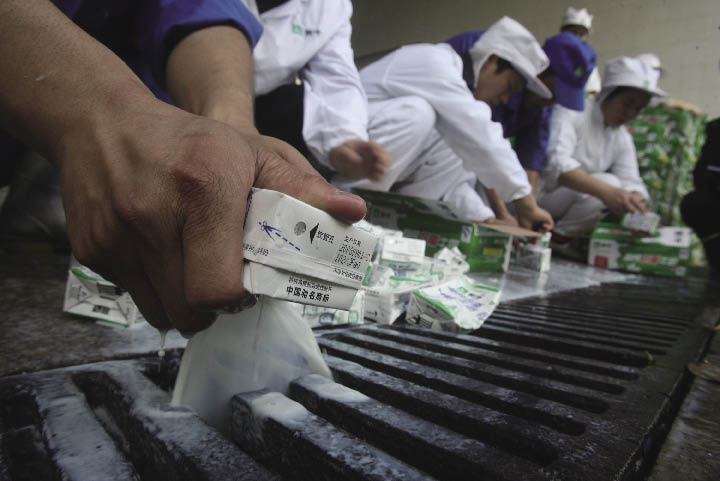|
Dairy consumption is still a recent phenomenon in China. Ten years ago only babies and older people drank milk, mainly in powdered form. Starting in 1999 the sales of UHT milk grew at an annual rate of 89 percent for five years straight, so that in urban areas liquid milk consumption is now greater than powdered consumption. According to 2006 statistics, China's urban residents each imbibed an average of 22.54 kilograms of dairy products per year, comprising 22.04 kilograms of liquid (including 18.32 kilograms of fresh milk and 3.72 kilograms of yogurt) and 0.5 kilograms of powder. But this has not changed China's status as the world's largest powered milk market, where annual consumption still exceeds 1 million tons.
Prior to the melamine contamination scandal, Sanlu, founded in 1956, held the leading spot in China's powdered milk sector for 15 years, with a market share well above 18 percent by 2007. Emerging from a tiny factory of merely 32 cows and 170 sheep, the company evolved into a conglomerate with dozens of branches all over China, in partnership with the Fonterra Co-operative Group of New Zealand. But the company now seems doomed to be bought out and split up.
Negotiations are underway for Sanyuan to purchase seven plants from Sanlu, whose RMB 10 billion in sales in 2007 far outweighed Sanyuan's modest takings of RMB 1.1 billion. But it appears unlikely the former giant will survive the melamine scandal, given government support for Sanyuan's takeover bid and an offer of assistance from the CITIC Group to finance the deal.
Foreign Companies Sense Opportunities
Untarnished local dairy companies are not the only beneficiaries of the melamine scare. Until very recently, 80 percent of the liquid milk market in China was occupied by Mengniu, Yili and Bright. But all have been hit badly by the melamine crisis, and their market share is coveted by a horde of eager foreign competitors. While major Chinese dairy producers were occupied with recalling products and attempting to salvage damaged reputations, the Japanese brewery Asahi launched its first milk brand in China on September 21, 2008, conspicuously labeled as a "green" product. It has consequently sold like hot cakes, despite carrying a price more than twice the market average, although for the moment Asahi Green Source only produces three tons of fresh milk daily. The company mainly supplies hotels, restaurants and major supermarkets in big cities such as Beijing, Shanghai and Qingdao.
Asahi Green Source was established in April 2008 and obtained its operation license in August. The company insists that the fortuitous timing of its debut was not calculated, but it could not have arrived at a better time.
In the powdered milk sector international brands have always reigned at the upper end of the market. Statistics from 2007 show that one-quarter of the high-grade baby formulas sold in China that year came from U.S. company Meadjohnson, who raked in RMB 1.6 billion that year. They were followed by U.S. company Wyeth, with a 20 percent market share, and French company Dumex with 12 percent.
 |
| Tainted milk goes down the drain Wuhan, Hubei Province. |
As domestic powdered milk is largely abandoned by customers, foreign brands are taking up the slack. Wyeth, for example, plans to build the world's largest powdered milk factory in Suzhou, Jiangsu Province, producing high-end baby formula. According to Xi Qing, the company's public relations chief, orders from large chain stores soared three-fold after the melamine scandal. Danone, the world's second largest dairy food group, merged with Miaoshi, a private dairy company, back in February 2008, and is working on similar deals with other home-grown companies.
|
